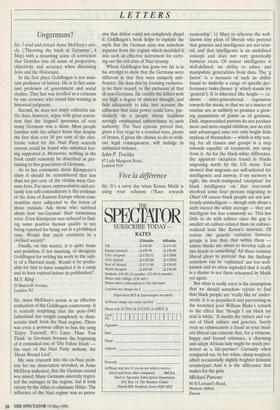Sir: Anne McElvoy's article is an effective evaluation of the
Goldhagen controversy. It is scarcely surprising that the post-1945 fatherland has sought completely to disas- sociate itself from the Nazi regime. There was even a postwar effort to ban the song `Enjoy Yourself, It's Later Than You Think' in Germany because the beginning of it reminded one of 'Die Fahne Hoch' the start of the Nazi Party anthem, the `Horst Wessel Lied'.
My own research into the ex-Nazi prob- lem for my dissertation revealed, as Anne McElvoy indicated, that the German record was mixed. Many Germans sincerely regret- ted the outrages of the regime, but it took victory by the Allies to eliminate Hitler. The influence of the Nazi regime was so perva- sive that defeat could not completely dispel it. Goldhagen's book helps to explode the myth that the German state was somehow separate from the regime which moulded it into such an effective instrument for carry- ing out the evil aims of Nazi tyranny.
Where Goldhagen has gone too far is in his attempt to show that the Germans were different in that they were uniquely anti- Semitic. He does this by focusing exclusive- ly on their record, to the exclusion of that of non-Germans. He credits the killers with too high a degree of abstract thought, and fails adequately to take into account the influence that state power could have, par- ticularly on a people whose tradition strongly emphasised subservience to such authority. The Nazi episode proved that, given a free reign by a criminal state, plenty of brutes, if given the chance to do so with- out legal consequences, will indulge in unlimited violence.
John P. Teschke 87 Lady Margaret Road, London N19


































































 Previous page
Previous page